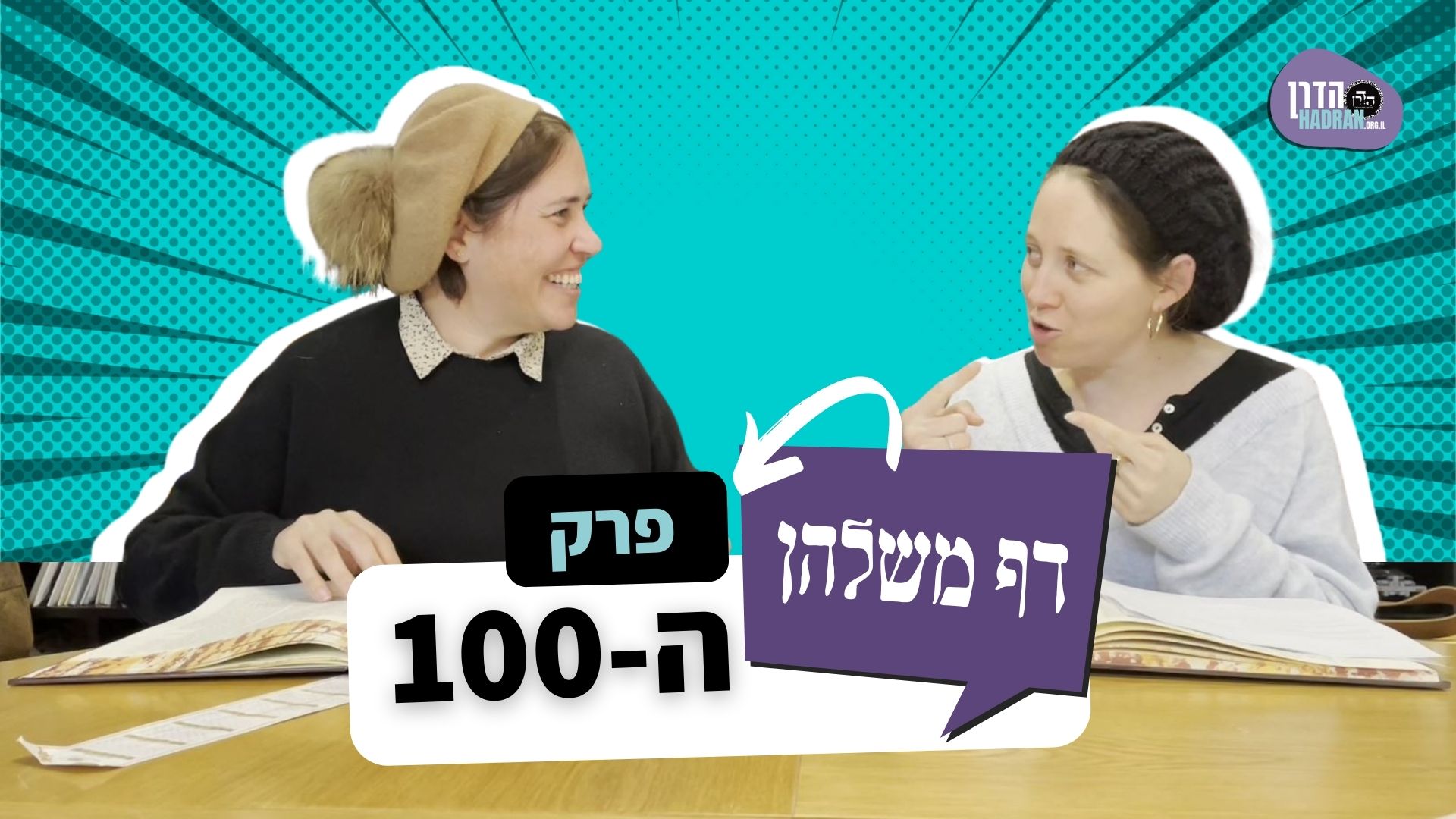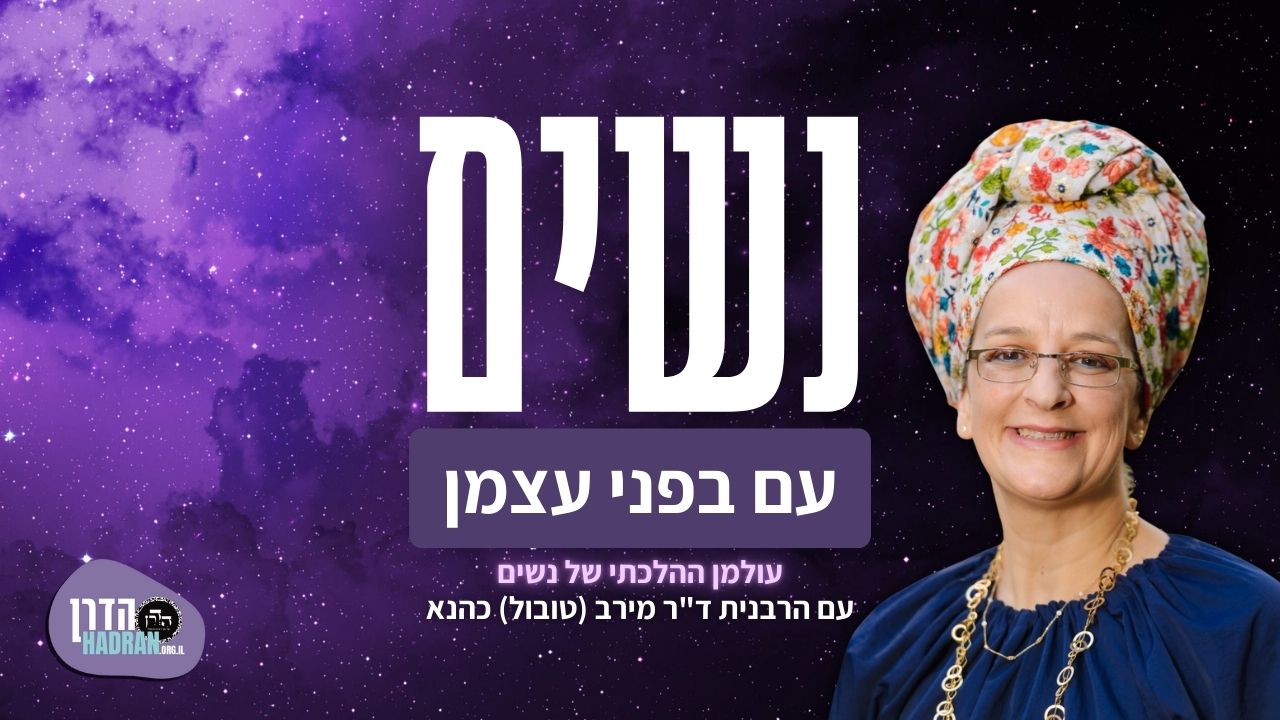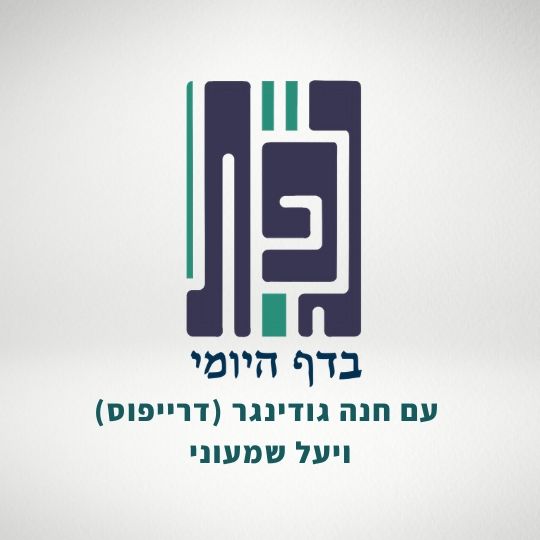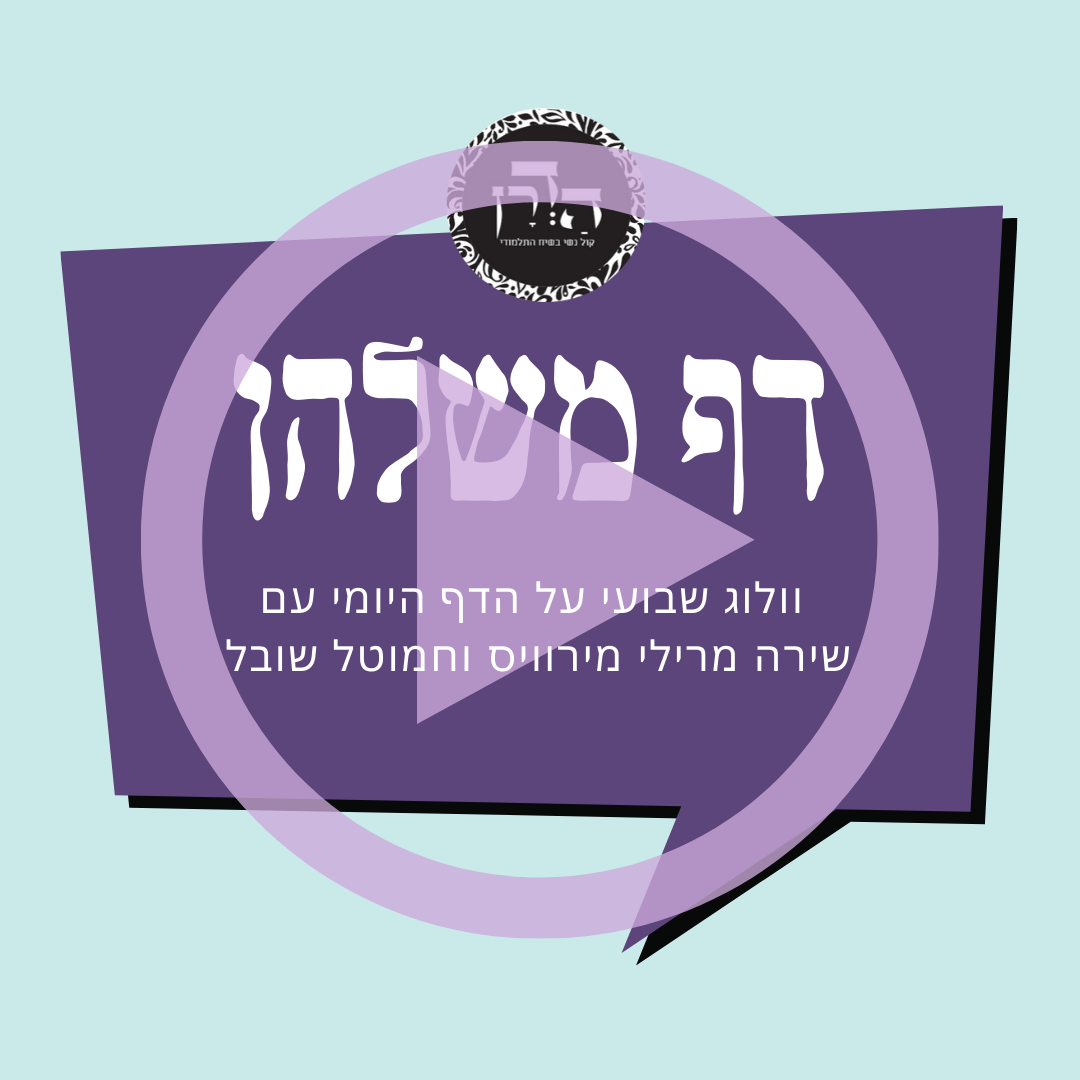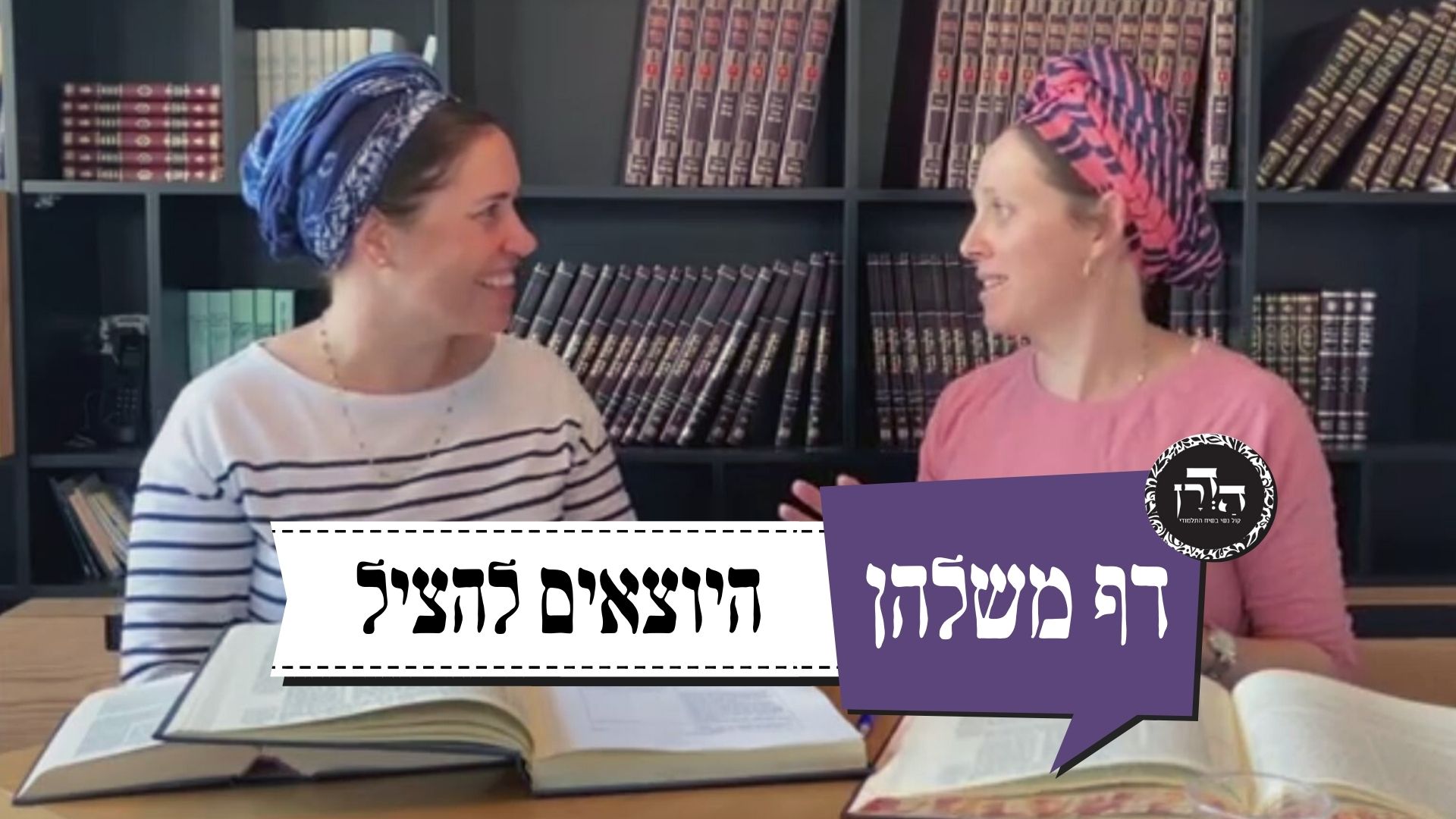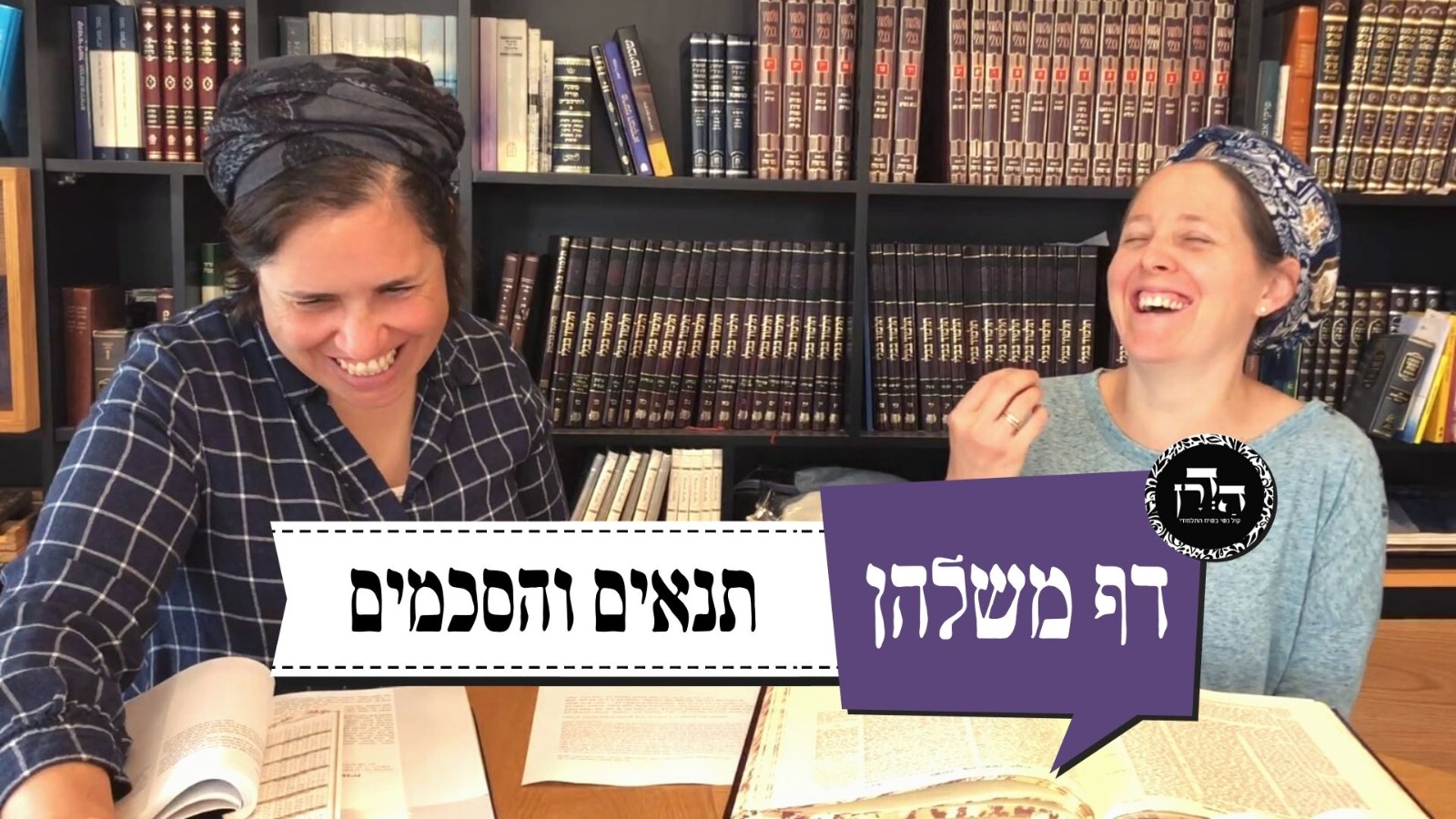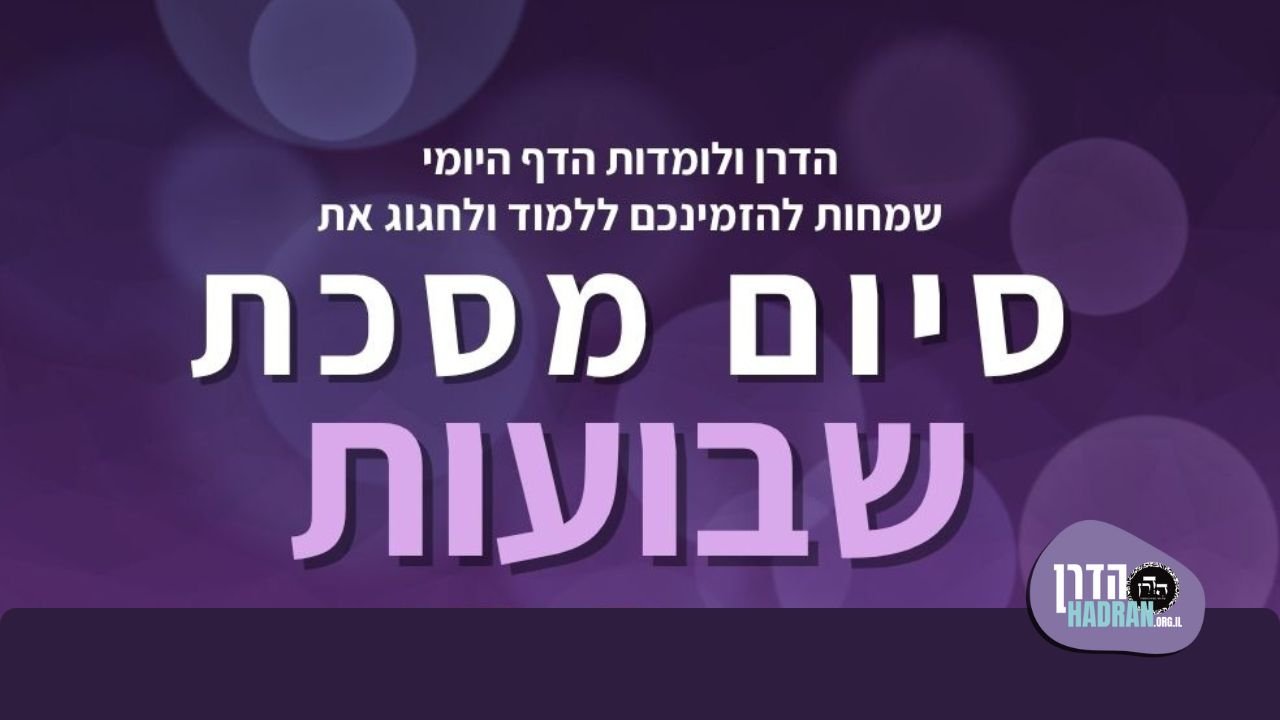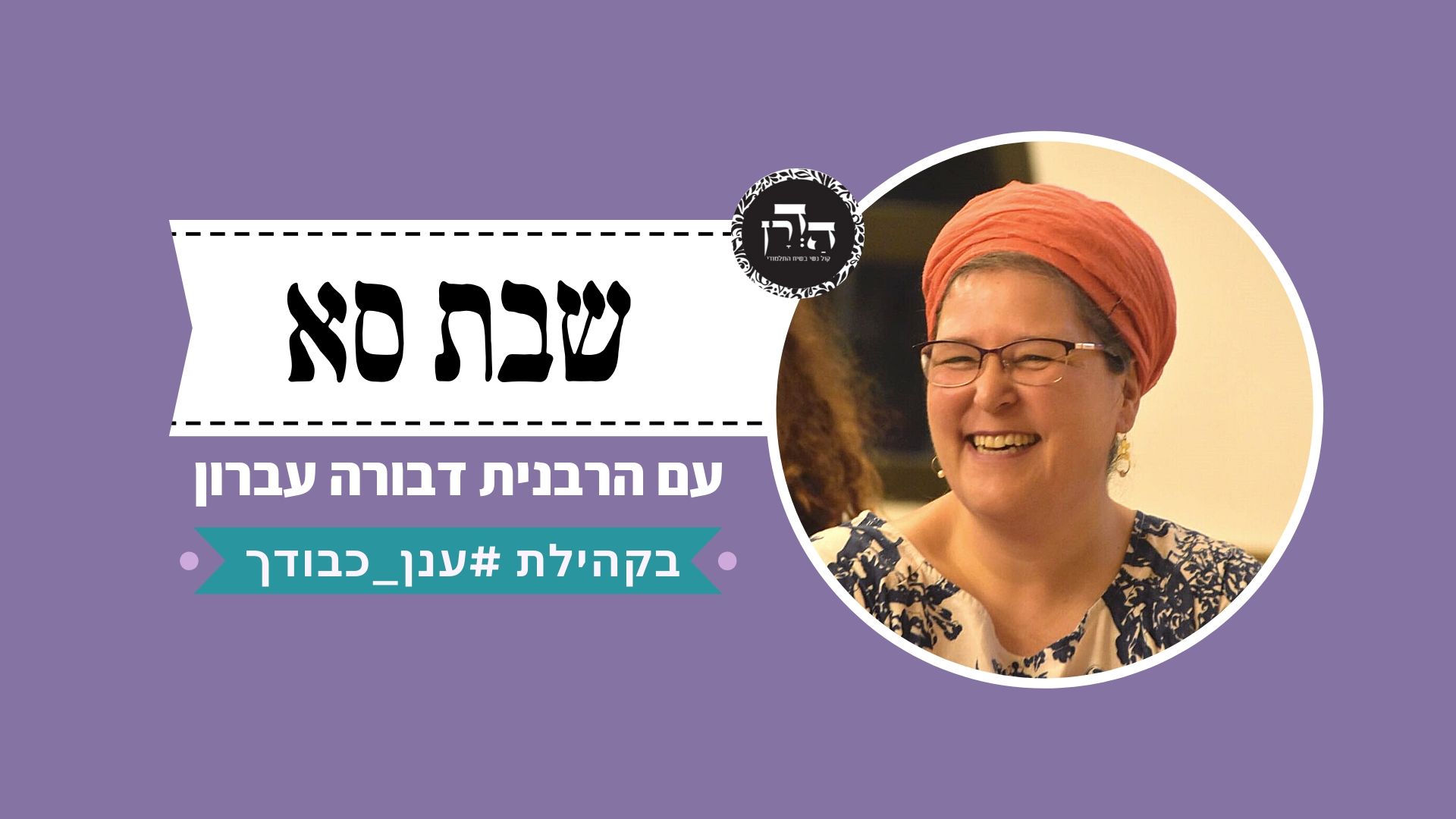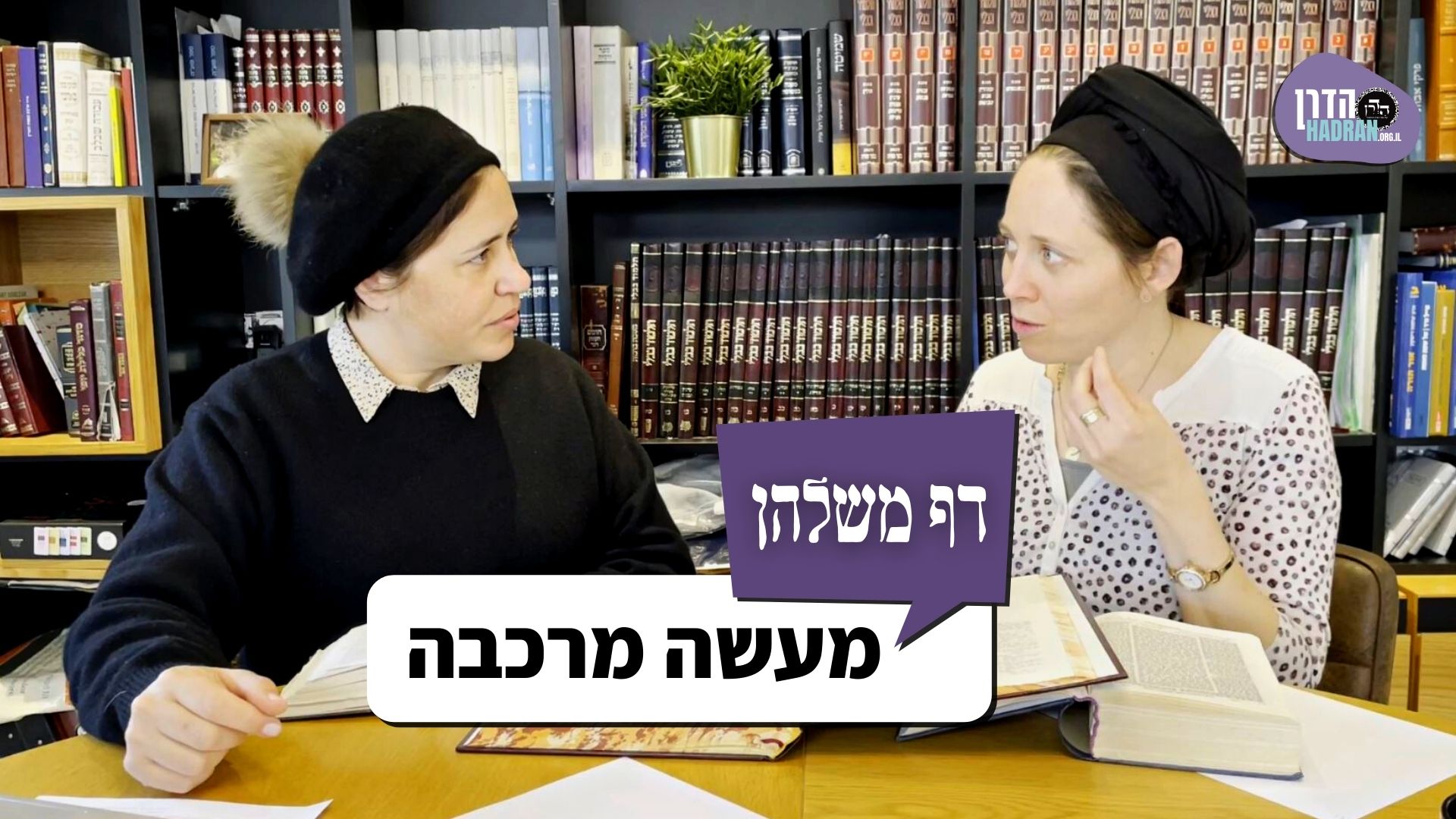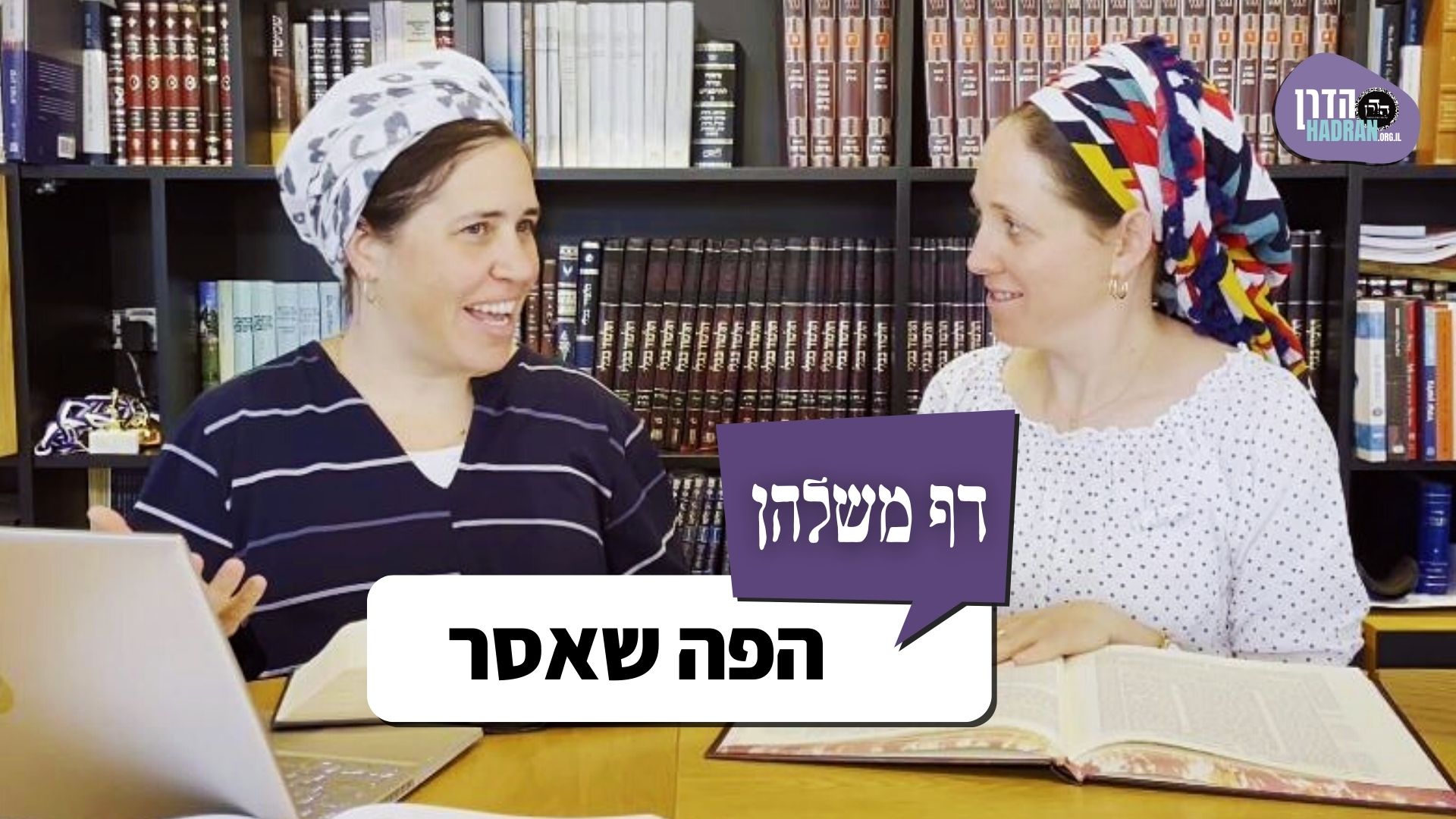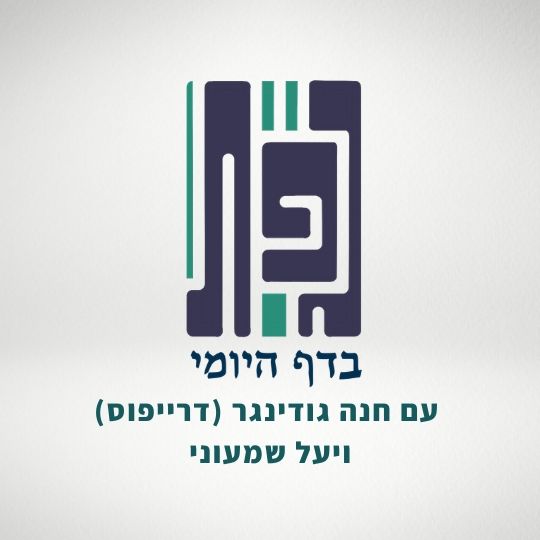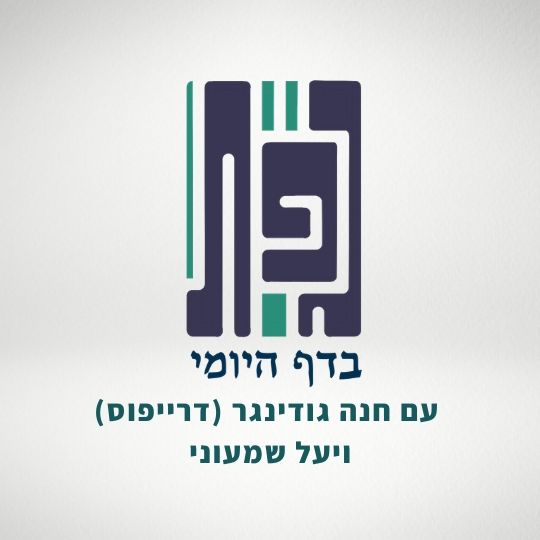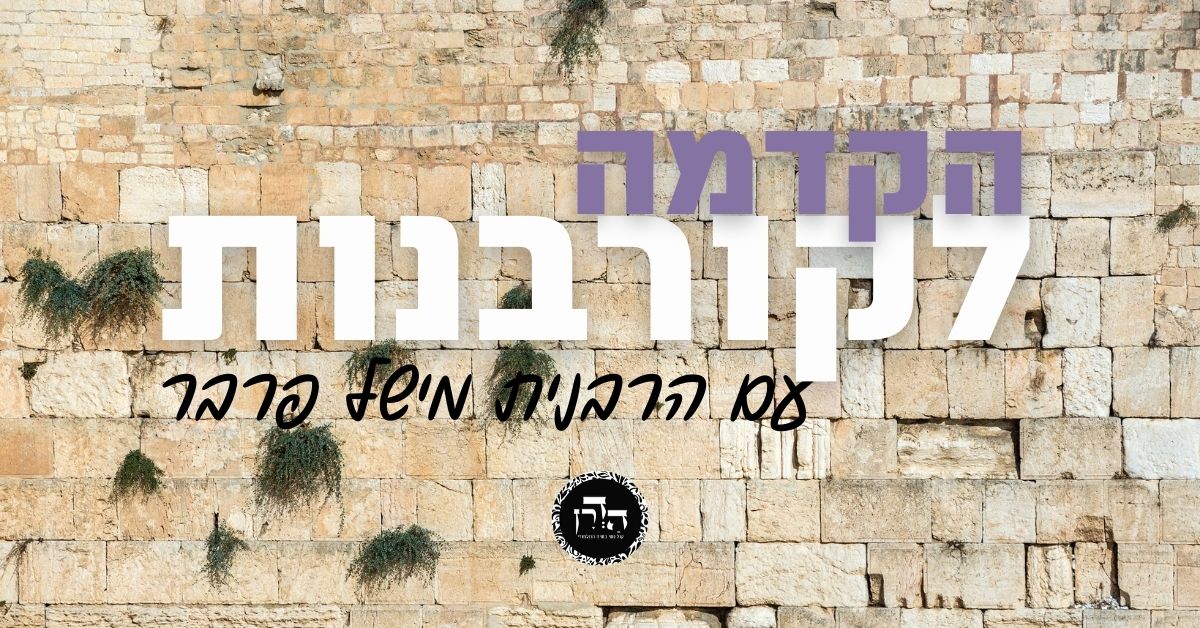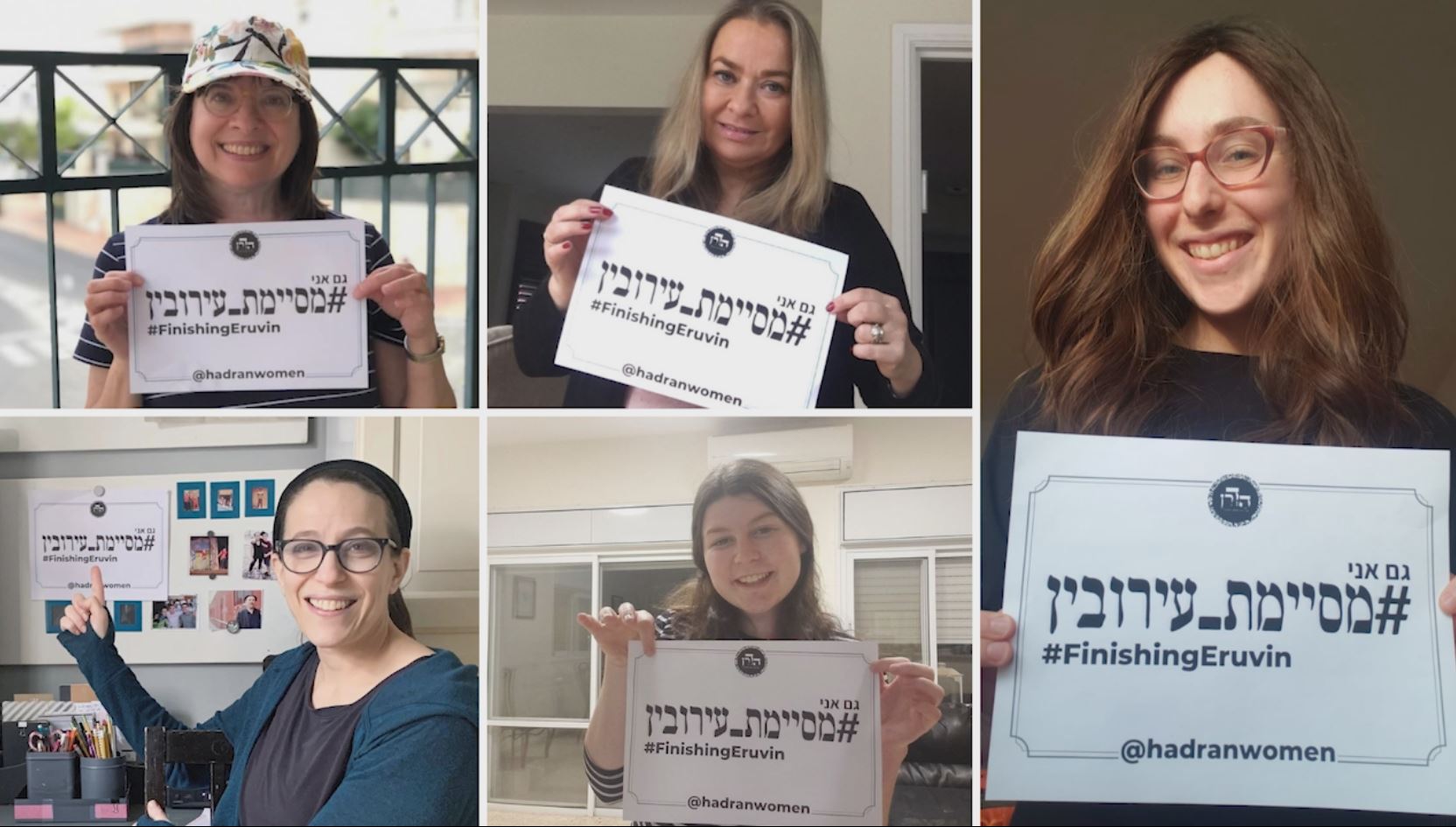מה היא השעה שקובע שעת היתר לכהנים שאליו התייחס ר’ יהושע במשנה (שאם עבר את השלב הזה ונפסל אחר כך, דיני מעילה לא יחולו בקדשי קדשים)- האם זה שנשחטה כראוי, נתקבל דמה כראוי או נזרק דמה כראוי? הגמרא מביאה הוכחות ממשנתינו וממקורות אחרים כדי להכריע.
רוצה להקדיש שיעור?
כלים
העמקה
רוצה להבין מה באמת קורה מתחת לפני השטח של הסוגיה?
שיעורים, פודקאסטים והרחבות של מיטב המורות שלנו יפתחו לך עוד זוויות וכיווני חשיבה.
חדשה בלימוד הגמרא?
זה הדף הראשון שלך? איזו התרגשות עצומה! יש לנו בדיוק את התכנים והכלים שיעזרו לך לעשות את הצעדים הראשונים ללמידה בקצב וברמה שלך, כך תוכלי להרגיש בנוח גם בתוך הסוגיות המורכבות ומאתגרות.
פסיפס הלומדות שלנו
גלי את קהילת הלומדות שלנו, מגוון נשים, רקעים וסיפורים. כולן חלק מתנועה ומסע מרגש ועוצמתי.
מעילה ה
אוֹ הֶיתֵּר זְרִיקָה שָׁנִינוּ, אוֹ הֶיתֵּר אֲכִילָה שָׁנִינוּ? חִזְקִיָּה אָמַר: הֶיתֵּר שְׁחִיטָה שָׁנִינוּ, רַבִּי יוֹחָנָן אָמַר: הֶיתֵּר אֲכִילָה שָׁנִינוּ.
Or was it fitness of sprinkling of the blood that we learned, i.e., once the blood is ready to be sprinkled, even if it was not sprinkled yet, the offering is no longer subject to the halakhot of misuse? Or was it fitness of consuming the meat of the offering that we learned? In other words, is it only after the blood was actually sprinkled properly, and the meat of the offering is permitted to be consumed by the priests, that the offering is no longer subject to the halakhot of misuse? The Gemara cites the different opinions with regard to this matter: Ḥizkiyya says: It was fitness of slaughtering that we learned, whereas Rabbi Yoḥanan says: It was fitness of consuming the meat of the offering that we learned.
אָמַר רַבִּי זֵירָא: לָא דַּיְיקָא מַתְנִיתִין דְּלָא כְּחִזְקִיָּה וּדְלָא כְּרַבִּי יוֹחָנָן.
The Gemara further discusses this matter. Rabbi Zeira says: The mishna is not precisely in accordance with the opinion of Ḥizkiyya nor precisely in accordance with the opinion of Rabbi Yoḥanan, i.e., a close reading of the mishna does not conform to either of their interpretations of the phrase: A period of fitness.
תְּנַן: שֶׁלָּנָה, וְשֶׁנִּטְמֵאת, וְשֶׁיָּצָאת. לָאו דְּלָן דָּם, וְקָתָנֵי: אֵין מוֹעֲלִין בּוֹ,
Rabbi Zeira elaborates: We learned in the mishna, in its list of examples of offerings that were disqualified after a period of fitness: A sacrificial animal that remained overnight after its blood was sacrificed on the altar and was therefore disqualified as notar, and one that was disqualified when it became ritually impure, and one that left the Temple courtyard and was thereby disqualified. Isn’t the case of remaining overnight referring to a situation where the blood remained overnight and was not sprinkled after it was collected in a cup? And yet the mishna teaches: One is not liable for misusing it, as there was a period of fitness.
וּשְׁמַע מִינַּהּ: הֶיתֵּר זְרִיקָה שָׁנִינוּ!
And therefore, one can learn from the mishna that it was fitness of sprinkling of the blood that we learned. Since the slaughtering and collecting of the blood was performed properly, the offering is no longer subject to the halakhot of misuse, despite the fact that the blood was not actually sprinkled. This is not in accordance with the opinion of Ḥizkiyya or with the opinion of Rabbi Yoḥanan.
לָא, דְּלָן בָּשָׂר, אֲבָל דָּם אִיזְדְּרִיק, מִשּׁוּם הָכִי קָתָנֵי: אֵין מוֹעֲלִין בּוֹ.
The Gemara rejects this conclusion: No, the mishna is not referring to a case where the blood had not been sprinkled. Rather, it is dealing with a case where the meat was left overnight, but the blood had already been sprinkled properly. It is due to this that the mishna teaches: One is not liable for misusing it, as there was a period of fitness of consuming the meat, as stated by Rabbi Yoḥanan.
תְּנַן: וְאֵיזוֹ הִיא שֶׁלֹּא הָיְתָה לָהּ שְׁעַת הַכּוֹשֶׁר לַכֹּהֲנִים? שֶׁנִּשְׁחֲטָה חוּץ לִזְמַנָּהּ, וְחוּץ לִמְקוֹמָהּ, וְשֶׁקִּבְּלוּ פְּסוּלִין וְזָרְקוּ אֶת דָּמָהּ.
The Gemara further analyzes Rabbi Yehoshua’s statement. We learned in the mishna: And which is the sacrificial animal that did not have a period of fitness for the priests? It is a sacrificial animal that was slaughtered with the intent to partake of it or sprinkle its blood beyond its designated time, or outside its designated area, or one that those who are unfit for Temple service collected its blood for use in the sacrificial rite and sprinkled its blood.
הֵיכִי דָּמֵי, אִילֵּימָא דִּזְרָקוּהוּ פְּסוּלִין וְקִבְּלוּהוּ פְּסוּלִין – לְמָה לִי עַד דְּאִיכָּא תַּרְתֵּי?
What are the circumstances referred to in the mishna, with regard to people who are unfit for collecting and sprinkling the blood? If we say that the mishna is dealing with a case where the blood was both sprinkled by those who are unfit for Temple service and the blood was also collected by those who are unfit for Temple service, this is difficult: Why do I need to say that it is not disqualified until there are two actions, collecting and sprinkling, which were performed improperly? After all, the offering is disqualified as soon as those who are unfit for Temple service collect the blood.
אֶלָּא לָאו דְּקִבְּלוּהוּ פְּסוּלִין וּזְרָקוּהוּ כְּשֵׁרִים, וְקָתָנֵי מוֹעֲלִין בּוֹ,
Rather, is it not referring to a case where the blood was collected by those who are unfit for Temple service but sprinkled by those who are fit? And the mishna thereby teaches us that it is only in this case that one is liable for misusing it. This is due to the fact that there was no period of fitness for sprinkling the blood. By contrast, had the blood been collected by those who are fit for Temple service, where the blood is fit for sprinkling, the offering would no longer be subject to the halakhot of misuse, even if it was sprinkled by those who are unfit for Temple service.
שְׁמַע מִינַּהּ: הֶיתֵּר זְרִיקָה שָׁנִינוּ.
If so, one can learn from the mishna that it is fitness of sprinkling of the blood that we learned. In other words, already at this stage the offering is no longer subject to the halakhot of misuse, despite the fact that the blood was not actually sprinkled. This is not in accordance with the opinion of Ḥizkiyya or the opinion of Rabbi Yoḥanan.
מַתְקֵיף לַהּ רַב יוֹסֵף: וְאִי סָלְקָא דַּעְתָּךְ אִיכָּא לְפַלּוֹגֵי הָכִי, הָא דִּתְנַן הָתָם:
Rav Yosef objects to this interpretation of the mishna: But if it enters your mind that there is a way to make this distinction in the mishna, between a case where the blood was collected by those who are unfit for Temple service and sprinkled by those who are fit and a situation where it was collected by those who are fit for Temple service and sprinkled by those who are unfit, then this would present a difficulty with regard to that which we learned in a mishna there (Zevaḥim 92a).
חַטָּאת פְּסוּלָה – אֵין דָּמָהּ טָעוּן כִּיבּוּס, בֵּין שֶׁהָיְתָה לָהּ שְׁעַת הַכּוֹשֶׁר וְנִפְסְלָה, וּבֵין שֶׁלֹּא הָיְתָה לָהּ שְׁעַת הַכּוֹשֶׁר וְנִפְסְלָה.
The Gemara cites the relevant mishna: With regard to a disqualified sin offering, its blood does not cause a garment to require laundering whether the offering had a period of fitness when its blood was fit for presentation or whether it did not have a period of fitness. In either case, as the offering is currently unfit, its blood does not require laundering.
אִי זוֹ הִיא שֶׁהָיְתָה לָהּ שְׁעַת הַכּוֹשֶׁר וְנִפְסְלָה? שֶׁלָּנָה, וְשֶׁנִּטְמֵאת, אוֹ שֶׁיָּצְאָה.
The mishna proceeds to explain: Which offering is the disqualified sin offering that had a period of fitness and was then disqualified? It is one that was left overnight and then became disqualified as notar; or it is one that became ritually impure; or it is one that left the Temple courtyard.
אֵיזוֹהִי שֶׁלֹּא הָיְתָה לָהּ שְׁעַת הַכּוֹשֶׁר? שֶׁנִּשְׁחֲטָה חוּץ לִמְקוֹמָהּ, חוּץ לִזְמַנָּהּ, וְשֶׁקִּבְּלוּ פְּסוּלִין וְזָרְקוּ אֶת דָּמָהּ.
Which offering is the disqualified sin offering that did not have a period of fitness? It is one that was slaughtered with the intent to eat it or present its blood beyond its designated time or outside its designated area; or it is one whose blood was collected by people disqualified for Temple service and they sprinkled its blood.
הֵיכִי דָמֵי? אִילֵּימָא דְּקִבְּלוּהוּ פְּסוּלִין וְזָרְקוּ פְּסוּלִין – הוּא דְּאֵין דָּמָהּ טָעוּן כִּיבּוּס, הָא קִבְּלוּהוּ וְזָרְקוּ כְּשֵׁרִים – דָּמָהּ טָעוּן כִּיבּוּס.
Rav Yosef analyzes this mishna: What are the circumstances of the mishna’s case? If we say that the mishna is referring specifically to a situation where the blood was both collected by those who are unfit for Temple service and also sprinkled by those who are unfit for Temple service, and it is only in such a case that its blood does not cause a garment to require laundering, it may be inferred that if the blood was collected by those who are fit for Temple service and sprinkled by those who are unfit, or collected by those who are unfit and sprinkled by those who are fit, then its blood does cause a garment to require laundering. But this inference is difficult: It is not possible to interpret the mishna in such a manner, as that conclusion is incorrect.
קְרִי כָּאן: ״אֲשֶׁר יִזֶּה מִדָּמָהּ״ – וְלֹא שֶׁכְּבָר הוּזָּה? אֶלָּא: לָאו דַּוְקָא,
The Gemara explains why the above conclusion is untenable: Read here the verse that states, with regard to laundering a garment on which the blood of a sin offering was sprayed: “And if any of its blood is sprinkled on a garment, you shall wash that upon which it was sprinkled in a holy place” (Leviticus 6:20). The Sages infer from the verse that this halakha applies only to the blood of a sin offering that has not yet been sprinkled, and not to blood of a sin offering whose blood had already been sprinkled. Rather, one can conclude that the language of the mishna with regard to the topic of the blood of a sin offering is not exact, as the same halakha applies even if the blood was collected and sprinkled by those who are fit.
הָכִי נָמֵי, לָאו דַּוְקָא. אָמַר רַב אַסִּי: אִם כֵּן, לְמָה לִי לְמִיתְנֵי תַּרְתֵּי?
If so, one can say that so too the mishna here is not exact, and therefore one cannot infer from it that the halakhot of misuse apply only when those who were unfit for Temple service collected the blood. Rather, the halakhot of misuse are in effect even if those who collected the blood were fit and those who sprinkled it were unfit, which means that the phrase: A period of fitness, can be referring to fitness of consuming the meat of the offering. Rav Asi said: If so, that the mishna is not exact, why do I need the tanna to teach two mishnayot in an inexact manner? It must be that at least one of them is taught in a precise fashion, and for that reason the same style was preserved in the other mishna.
אֶלָּא לְעוֹלָם דִּמְעִילָה דַּוְקָא,
Rather, one must say that only one mishna is imprecise, i.e., the one in Zevaḥim with regard to the blood of a sin offering, and actually the mishna here with regard to misuse of consecrated property is precise, and therefore one can infer that the meaning of the phrase: A period of fitness, is fitness to sprinkle the blood.
וְהָא קָא מַשְׁמַע לַן: דְּפָסוּל עוֹשֶׂה שִׁירַיִים,
And as for the mishna in Zevaḥim, which speaks of those who are unfit for collecting the blood despite the fact that the same halakha applies if those who are fit collected it, this is what it teaches us: That if those who are unfit for Temple service collected some of the blood, it renders the blood, including that which he did not collect, as leftovers. The blood has the same status as the remainder of the blood of a fit offering after some of its blood was sprinkled on the altar.
אַף עַל גַּב דְּקִיבֵּל פָּסוּל וְזָרַק, וְקִיבֵּל כָּשֵׁר וְזָרַק – לָאו כְּלוּם הִיא. מַאי טַעְמָא? דְּשִׁירַיִים נִינְהוּ.
And consequently, it teaches with regard to a case where the blood was collected in two vessels, that even though the priest who was unfit collected the blood and sprinkled it, and a priest who was fit subsequently collected the blood and sprinkled it, the sprinkling of the fit priest is considered as though he did not do anything. What is the reason for this? The reason is that the blood is considered leftovers.
וְהָא בְּעָא מִינֵּיהּ רֵישׁ לָקִישׁ מֵרַבִּי יוֹחָנָן: פָּסוּל, מַהוּ שֶׁיַּעֲשֶׂה שִׁירַיִים?
The Gemara objects: But didn’t Reish Lakish ask Rabbi Yoḥanan: In the case of an individual unfit for Temple service who sprinkled the blood, what is the halakha with regard to the remaining blood? Does the fact that he sprinkled some of the blood render the remaining blood leftovers?
וַאֲמַר לֵיהּ: אֵין לְךָ דָּבָר שֶׁיַּעֲשֶׂה שִׁירַיִים אֶלָּא חוּץ לִזְמַנּוֹ וְחוּץ לִמְקוֹמוֹ, הוֹאִיל וּמְרַצִּין לְפִיגּוּלָן.
And Rabbi Yoḥanan said to him in response: You do not have a matter of an invalid sprinkling that renders the remaining blood leftovers except for a case where he sprinkled the blood with the intent to consume the offering beyond its designated time or outside its designated area. In these instances it is considered a significant sprinkling, since this sprinkling with improper intent effects acceptance, i.e., it is considered a valid sprinkling with regard to rendering the meat of the offering piggul.
מַאי לָאו, בַּר מִפָּסוּל? לָא, אֲפִילּוּ פָּסוּל.
The Gemara analyzes Rabbi Yoḥanan’s statement: What, is it not the case that when he said that only piggul intent renders the blood leftovers, this is to the exclusion of a sprinkling performed by an unfit priest? If so, this would mean that an unfit priest does not render the remainder of the blood leftovers, which contradicts the opinion of Rav Asi. The Gemara rejects this inference: No, even an unfit priest renders the blood leftovers.
וְהָא ״אֵין לְךָ״ קָתָנֵי!
The Gemara objects: But Rabbi Yoḥanan taught in a broad manner: You do not have a matter of an invalid sprinkling that renders the remaining blood leftovers except for a case where he sprinkled the blood with the intent to consume the offering beyond its designated time or outside its designated area. Evidently, Rabbi Yoḥanan maintains that the blood is rendered leftovers only in those cases.
הָכִי קָתָנֵי: אֵין לְךָ דָּבָר שֶׁאֵינוֹ מְרַצֶּה בְּצִיבּוּר וְעוֹשֶׂה שִׁירַיִים אֶלָּא חוּץ לִזְמַנּוֹ וְחוּץ לִמְקוֹמוֹ, אֲבָל טָמֵא, דְּאִיתֵיהּ בְּצִיבּוּר – מְשַׁוֵּי שִׁירַיִים,
The Gemara explains that this is what Rabbi Yoḥanan is teaching: You do not have a matter of an invalid sprinkling that does not effect acceptance in the case of offerings of the community, and yet which renders the remaining blood leftovers, except for a case where he sprinkled the blood with the intent to consume the offering beyond its designated time or outside its designated area. Although these offerings are not sacrificed, nevertheless the sprinklings render the blood leftovers. But Rabbi Yoḥanan was not referring to a ritually impure priest, who is fit to effect acceptance for offerings of the community in a case where the majority of the community is impure, as he does render the remainder of the blood leftovers.
שְׁאָר פְּסוּלִין דְּלָא אִיתַנּוּן בְּצִיבּוּר – לָא מְשַׁוִּין שִׁירַיִים.
By contrast, with regard to all other invalid sprinklings, which are not fit to effect acceptance in the case of offerings of the community, e.g., a blemished priest, they do not render the blood leftovers. Accordingly, Rav Asi’s comment, that the mishna in Zevaḥim teaches that if those who are unfit for Temple service collect some of the blood they thereby render the blood leftovers, is referring only to an impure priest.
תָּא שְׁמַע: הַפִּיגּוּל – לְעוֹלָם מוֹעֲלִין בּוֹ.
The Gemara further analyzes Rabbi Yehoshua’s phrase: That had a period of fitness to the priests. Come and hear a baraita: With regard to an offering of the most sacred order that is piggul, one who derives benefit from it is always liable for misuse of consecrated property.
לָאו דְּלֹא זָרַק, וּשְׁמַע מִינַּהּ: הֶיתֵּר זְרִיקָה שָׁנִינוּ!
The Gemara analyzes this statement: Is this not referring to a case where the priest collected the blood but did not yet sprinkle it? If so, this would mean that it is specifically the collection of the blood after the intent of piggul that does not remove the offering from the halakhot of misuse. One can infer from here that if the blood was collected with the proper intent, i.e., when the offering is not piggul, and is ready to be sprinkled, it does remove the offering from the halakhot of misuse. Accordingly, conclude from the baraita that it is fitness of sprinkling of the blood that we learned in the mishna.
לָא, זַרְקֵהּ.
The Gemara rejects this inference: No, one cannot cite a proof from here, as it is possible that the baraita is referring to a case where the priest already sprinkled the blood. If so, the reason that one is liable for misuse is because the sprinkling of piggul does not remove it from the halakhot of misuse. It can therefore be inferred from the baraita that if the offering was not piggul, then the sprinkling would remove it from misuse. This interpretation is in accordance with the opinion that when Rabbi Yehoshua referred to a period of fitness, he meant fitness of consuming the meat of the offering, i.e., only when the blood was sprinkled properly.
וּמַאי ״לְעוֹלָם״? הָא קָא מַשְׁמַע לַן כִּדְרַב גִּידֵּל, דְּאָמַר רַב גִּידֵּל אָמַר רַב: זְרִיקַת פִּיגּוּל – אֵינוֹ מוֹצִיא מִידֵי מְעִילָה, וְאֵינוֹ מֵבִיא לִידֵי מְעִילָה.
And if so, what does the baraita mean when it states that one who derives benefit from an offering that is piggul always remains subject to the halakhot of misuse? This is what the baraita teaches us by this phrase, that the halakha is in accordance with the opinion of Rav Giddel, as Rav Giddel said that Rav said: Sprinkling the blood of an offering with piggul intent does not remove the offering from the status of being subject to the halakhot of misuse, in the case of offerings of the most sacred order. And similarly, such a sprinkling does not bring the sacrificial portions of offerings of lesser sanctity into the status of being subject to the halakhot of misuse.


